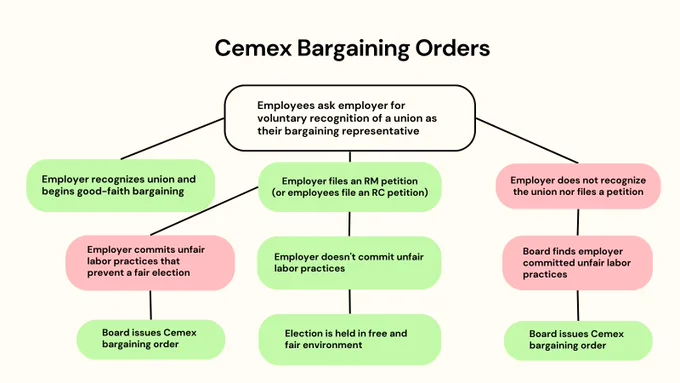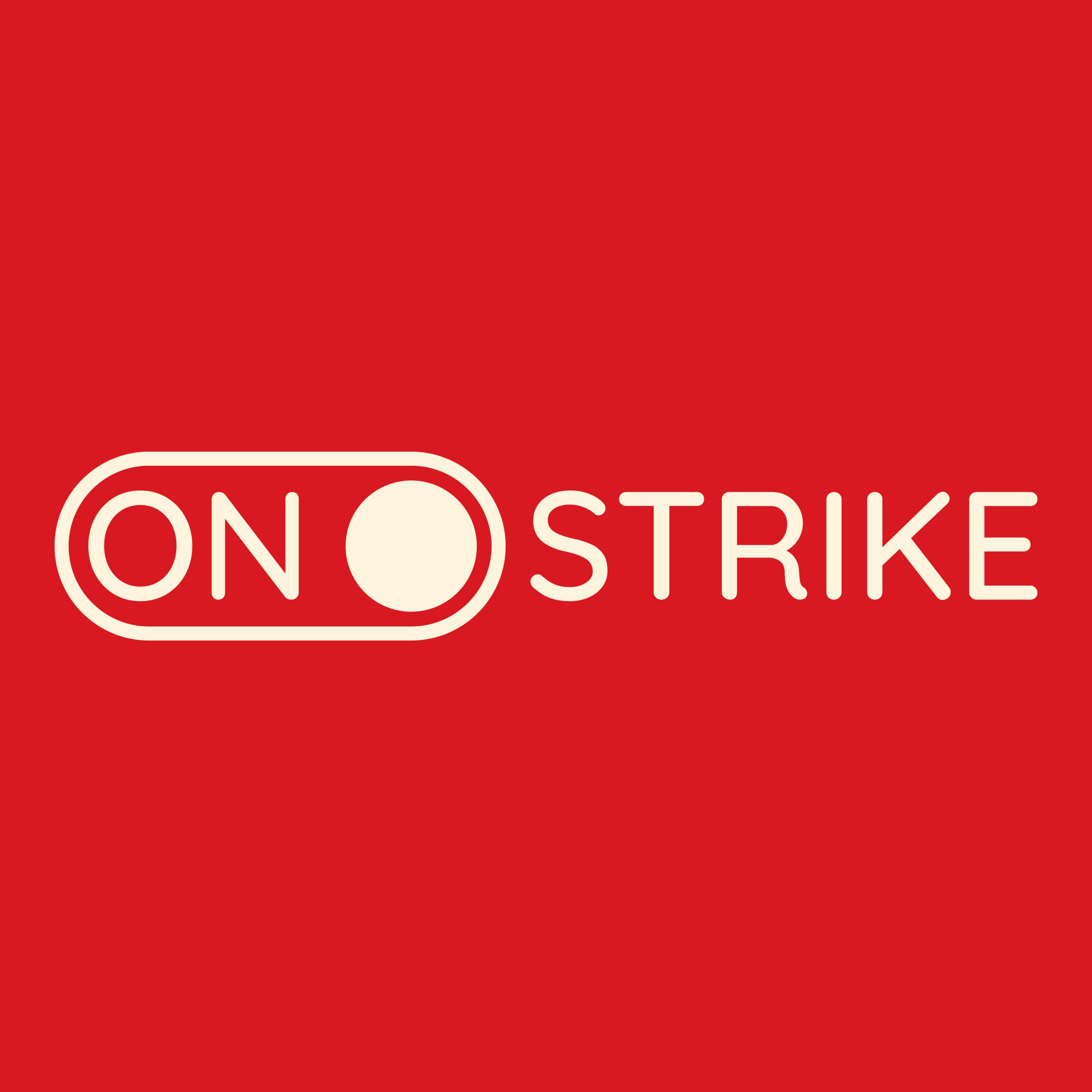Posts tagged Jennifer Abruzzo
More workers move to create unions — but that doesn’t always mean more members
October 16, 2023 // Data from the National Labor Relations Board released on Friday shows the number of union petitions filed in the past year — from October 2022 to September of this year — rose 3%. That’s on top of a whopping 53% increase the year before. More union petitions doesn’t immediately mean more union members, however. The tight labor market is making workers more comfortable with circulating petitions to unionize, according to Gordon Lafer at the University of Oregon.
Case Headed to NLRB Might Prohibit Employers from Holding ‘Captive Audience’ Meetings
October 12, 2023 // Another term for a captive audience meeting is "employer speech during a union campaign," said Daniel Johns, an attorney with Cozen O'Connor in Philadelphia. The purpose of the communication is to give the employer the opportunity to speak to employees about unionization during a campaign, a right protected by the First Amendment, he said. Such meetings are currently prohibited only within 24 hours prior to a union election. If the NLRB bans captive audience meetings across the board, employers "would be severely limited in their ability to communicate with their employees regarding unionization," Toppel said. A captive audience meeting educates employees about unions, the cost of unions, and what unions can and can't do, said James Redeker, an attorney with Duane Morris in Philadelphia. Also, there is education about how unions get employees to sign union authorization cards.
NJ Medieval Times Employees Appeal to National Labor Relations Board in Ongoing Joust with Union Officials
September 21, 2023 // he Request for Review notes that AGVA union officials were “secretive, self-interested, and divisive,” and “regularly advocated that the [Medieval Times] employees go on strike, something that had no support among the unit employees.” After waiting out the statutory one-year bar on union elections that follows a union’s certification, Morley filed the petition requesting a union decertification vote. According to the Request for Review, instead of processing the petition as NLRB rules dictate, NLRB Region 22 issued a complaint against the employer and dismissed Morley’s petition based on unproven “blocking charges” AGVA union officials filed against Medieval Times management. The Request for Review argues that the hasty dismissal violated NLRB election rules, the Administrative Procedure Act, and well-established NLRB precedent requiring a hearing to demonstrate whether union allegations of employer misconduct actually caused employee discontent with the union. “None of the alleged unfair labor practice allegations…concern the Employees’ collection of the decertification signatures or the Employer’s domination of the Union. Thus…an election should be held and the votes immediately counted,” the Request for Review contends. “Even if the Board determined the allegations warranted consideration under [NLRB rules], its plain terms prohibit dismissing a petition prior to an election.”
Will Starbucks’ union-busting stifle a union rebirth in the US?
August 28, 2023 // Many baristas say one Starbucks strategy in particular has discouraged workers from unionizing. In May 2022, Schultz announced that Starbucks would give certain raises and benefits to workers at its more than 9,000 non-union stores, but not offer those raises and benefits to its unionized workers. Starbucks insists it would be illegal to impose any raises or benefits on its unionized stores without first negotiating about them, but the NLRB’s general counsel asserts that this policy constitutes unlawful discrimination against Starbucks’ unionized workers. Under this policy, Starbucks has given its non-union workers, but not its unionized ones, a more relaxed dress code, increased training, faster sick leave accrual and, most important, credit card tipping. (Workers at the first few Starbucks stores to unionize had asked early on for credit card tipping.)

It’s getting easier for workers to unionize. One simple chart shows the new steps.
August 28, 2023 // In a new ruling, the National Labor Relations Board laid out what will now happen if employers trying illegal union-busting activity. If workers want a union, and employers use illegal tactics in the run-up to a union election that could compromise the election — like firing union organizers, or retaliating against workers engaging in protected union activities — the new rules says workers no longer have to hold a fresh election. Workers will instead automatically get their union and employers will have to bargain with them.

Pro-Union Shift Expected With Labor Board Member’s Pending Exit
August 21, 2023 // Abruzzo has asked the board to resurrect the Joy Silk doctrine—which would allow unions to bypass an official NLRB election with a card-check vote instead—and overturn the 1940’s Babcock & Wilcox ruling to make captive audience meetings unlawful. In another pending case, the board also may decide the fate of the 1970 Ex-Cell-O precedent, which prohibits the NLRB from forcing companies or unions to accept provisions of a collective bargaining agreement. Overturning that decision would allow the board to levy financial remedies against companies to compensate workers for what they could’ve earned with good-faith contract negotiations. The NLRB’s August agenda also includes finalizing regulations to expand the factors that can trigger a joint-employer finding. The rule, proposed nearly a year ago, would eliminate the stricter joint employment standard established by the Trump-era board. Other pending cases could boost the potency of worker strikes, expand the scope of labor law protections, and make other changes that bolster worker and union power.
Joe Biden and fellow Democrats are bullying job creators to boost unions
August 4, 2023 // Cassidy called out President Biden’s Department of Labor for “weaponizing its enforcement power against business,” specifically by ratcheting up rhetoric against job creators while loosening regulations on unions. Yet such actions are par for the course in an administration whose leader promised to be “the most pro-union president” in history.

Hotel Workers Strike against Scab Staffing App and Anti-Black Racism
August 2, 2023 // Bradley said he’s been trying to get a permanent hotel job for more than a decade, and suggested that discrimination was the reason he was passed over. “I think I’ve proven myself, and it’s still not enough,” he said. UNITE HERE has negotiated contract language to push hotels to hire Black workers, starting in Local 1 in Chicago in 2006, with similar language in contracts in Boston and Los Angeles. “Often we’re put against each other, right?” said Briceño. “So through all these years that we’ve been bargaining, we take the opportunity to educate our top leaders, folks that come to the negotiation, to understand the need to speak with one voice for the workers and the inclusion of Black workers.”

On the Matter of Card Check, the Losers Are the Workers
July 31, 2023 // Neutrality agreements and the card check process they enable deprive employees of information necessary for making informed decisions about unionization and worse, it opens the door to intimidation by taking away workers’ right to a secret ballot in union organizing elections. Neutrality agreements often require employers to accept a process called card check, which replaces NLRB-supervised secret ballot elections. Card check is an open petition process which leaves employees vulnerable to organizing campaigns that are rife with coercion and deception. Card check can fail to reflect employees' true wishes, undermining the democratic principles on which fair representation should be built. Examples of problems with card check include employees being told to sign a card simply to say they attended a union meeting or to get a free t-shirt. Worse, the study documented testimony from a February 8, 2007 U.S. House of Representatives Committee hearing which detailed that the United Auto Workers had “union employees from other facilities actually visit … employees at their homes. The union’s organizers refuse to take ‘no’ for an answer. ... Some employees have had 5 or more harassing visits from these union organizers.”

Biden Labor Board May Have Just Opened The Door For Union Activists To Infiltrate Private Companies
July 6, 2023 // David Osborne, fellow at the Institute for the American Worker, told the DCNF that non-competes are a valuable tool for businesses. “Eliminating noncompete agreements would make it easier for union ‘salts’ to infiltrate American businesses; eliminating noncompete agreements would allow them to move more freely from business to business pushing unionization on other employees,” Osborne said. “But the more immediate effect is to put the government’s thumb on the scales of union organizers by removing a perfectly acceptable tool—noncompete agreements—that American businesses have long used to protect valuable intellectual property.” As for how the efforts will affect workers, Osborne said that inevitably, “unionized employers will have to be less trusting of employees, less generous, and stricter about who receives access to valuable intellectual property, knowing that employees can immediately secure a job with their closest competitors at any time.”
